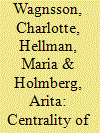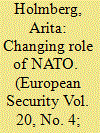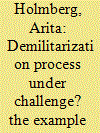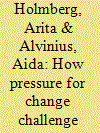| Srl | Item |
| 1 |
ID:
095499


|
|
|
|
|
| Publication |
2010.
|
| Summary/Abstract |
The globalized security situation characterized by transnational threats and international interventionism in "new wars," connect non traditional local actors and traditional global actors to one another in unprecedented ways. We argue that children in particular need to be highlighted because they are highly pertinent to the globalized security situation, yet they make up one of the few agents that have remained non-politicized in the eyes of the scholarly community. The article suggests a framework of analysis that can generate analyses on security of traditional as well as non-traditional agents. Placing non-traditional groups in the center of attention serves to mirror the complexities of the current security situation better.
|
|
|
|
|
|
|
|
|
|
|
|
|
|
|
|
| 2 |
ID:
108770


|
|
|
|
|
| Publication |
2011.
|
| Summary/Abstract |
The North Atlantic Treaty Organisation's (NATOs) changing role was debated in the face of the Strategic Concept adopted in late 2010. Two main roles can be identified in the debate; that of NATO as a defence organisation and a security organisation. The article analyses the implications of these roles for security governance and the Alliance's legitimacy - with emphasis on the novelties associated with the role of NATO as a security organisation. This development suggests an increasing need for security governance, something which is reflected in the debate. However, how for instance decision-making and implementation function in a more fragmented environment is unclear. If NATO develops its role as a security organisation new audiences are introduced that determine its appropriateness and the basis of the Alliance's input and output legitimacy changes.
|
|
|
|
|
|
|
|
|
|
|
|
|
|
|
|
| 3 |
ID:
141784


|
|
|
|
|
| Summary/Abstract |
During the past decades, the process of militarization that characterized Sweden after the Second World War has been replaced by a process of demilitarization. With the debates following the war in Georgia 2008 and the Russian annexation of Crimea in 2014, this process of demilitarization appears under challenge. This raises questions about the nature of these processes and the problems facing the attempts at turning them around. The article introduces a framework for analysing the influence of the military upon politics and society in the twenty-first-century European context with the aim of better understanding the various traits, their interconnections and relation to broader trends in Europe and the West. The analysis shows that traits of demilitarization are still dominating in Sweden, although some indications of remilitarization can be found.
|
|
|
|
|
|
|
|
|
|
|
|
|
|
|
|
| 4 |
ID:
165355


|
|
|
|
|
| Summary/Abstract |
This article elaborates on how structural, normative and functional pressures for change may challenge military organizational characteristics. We problematize theoretically and exemplify empirically what consequences these pressures can have on military organizational characteristics, arguing that they constitute major challenges for managing in particular normative pressures for change. The empirical examples suggest that bureaucratic, hierarchical, narcissistic and greedy traits of the organization are challenged by normative pressures such as value changes and normalization. Another source of challenge is professionalization processes. Structural challenges, on the other hand, are managed by the organization and do not seem to inhibit the workings of organizational characteristics. The plausibility probe conducted questions the sustainability of military organizational characteristics in their traditional disguise, in particular due to legitimacy concerns. It is suggested that future research should be directed towards analyzing how military organizations manage pressure for change and whether their characteristics are questioned.
|
|
|
|
|
|
|
|
|
|
|
|
|
|
|
|